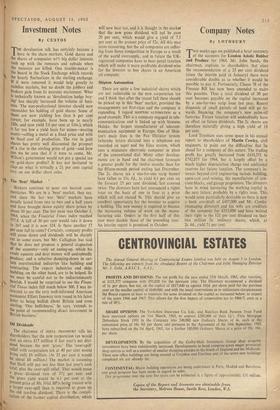Investment Notes
By CUSTOS
THE devaluation talk has certainly become a bore in the share markets. Gold shares and the shares of companies with big dollar interests rush up with the rumours and subside when the rumours are killed. One trouble-maker is the board in the Stock Exchange which records the hourly fluctuations in the sterling exchange. If it were removed it would help greatly to stabilise markets, but no doubt the jobbers and brokers gain from its neurotic excitement. What is technically known as 'devaluation hedge buy- ing' has sharply increased the volume of busi- ness. The non-professional investor should now reconsider his holding of gold shares. Some of them are now yielding less than 6 per cent (oFsrr, for example, have been up to nearly 120s. and now yield 5.6 per cent at 116s.), which Is far too low a yield basis for mines—wasting assets—selling a metal at a fixed price and with no fixed cost of production. The rise in gold shares has pretty well discounted the prospect of a rise in The sterling price of gold—and how can we be sure that if it were to come, Mr. Wilson's government would not put a special tax on gold-share profits? It has not hesitated to clap on what is virtually a 21 per cent capital levy on our dollar share sales.
The 'Bear' Market '
Brokers continue to pour out bearish com- mentaries. We are in a 'bear' market, they say, and since the last war 'bear' markets have usually lasted from two to two and a half years and have brought down equity share prices by about 30 per cent. The last peak was October 1, 1964, when the Financial Times index reached 377.8. A fall of 30 per cent would take it down to 267 and it is now 324. Is there another 17 Per cent fall to come? Certainly, company profits will come down and dividends will be sharply cut in some cases, but Mr. Callaghan has said that he does not propose a general stagnation of the economy—only an easing-up, which his Credit squeeze and dear money will undoubtedly produce, and a selective damping-down in cer- tain overstretched industries like building and contracting. The export industries and ship- building, on the other hand, are to be helped. So we must be careful not to be indiscriminately bearish. I would be surprised to see the Finan- cial Times index fall much below 300. I was in- terested to see the very well-informed American economist Elliott Janeway turn round in his latest letter to being bullish about Britain and even sterling. 'Our bullishness,' he says, 'extends to the point of recommending direct investment in British business.'
011 Dividends
The chairman of stult.. TRANSPORT tells his shareholders that the new corporation tax would cost an extra £17 million if last year's net divi- dend became the new 'gross.' The 'over-spill' relief with corporation tax at 40 per cent would bring only £6 million. (At 35 per cent it would be about £8 million.) The market is assuming that Shell will pay not less than last year's cash total, plus the over-spill relief. That would mean a gross dividend rate of 37f per cent and the gross yield would be 6.1 per cent at the present price of 30s. 101d. BP is bettes treated with a larger over-spill than is required to gross up the old tax-free dividend. There is the compli- cation of the former capital distribution, which
will now bear tax, and it is thought in the market that the new gross dividend will not be over 20 per cent, which would give a yield of 7.7 per cent at the present price of 52s. All this may seem reassuring, but the oil companies are suffer- ing from fierce competition in Europe as a result of the world oversupply, and in future the UK- registered companies have to bear penal taxation which will make it more profitable dividend-wise for the investor to buy shares in an American oil company.
Shipton Automation
There are quite a few industrial shares which are not vulnerable to the new corporation tax and I think that after the recent fall these should be picked up in this 'bear' market, provided the managements are first-class and the company is expanding. I regard SHIPTON AUTOMATION as a good example. This is a company engaged in tele- communications and is linked up with Siemens Halske, the largest manufacturer of telecom- munication equipment in Europe. One of Ship- ton's main lines is the Pax Dictator system (whereby letters dictated into a telephone are recorded on tape) and the Edas system, which uses a miniature electronic computer in place of the conventional dial. Many other develop- ments are in hand and the chairman forecasts a greater profit for the twelve months than for the fifteen-month period ending last December. The 2s. shares (ex a one-for-one scrip bonus) have fallen to I Is. 6d., to yield 4.1 per cent on the forecast 25 per cent dividend, last covered twice. The directors have just announced a rights issue on the basis of one in four at a price which will not exceed 9s. This should give an excellent opportunity for the investor to acquire a holding. The new money is required to finance the increasing volume of work on the manu- facturing side. Orders in the first half of this year were double those of the preceding year. An interim report is promised in October.






























 Previous page
Previous page